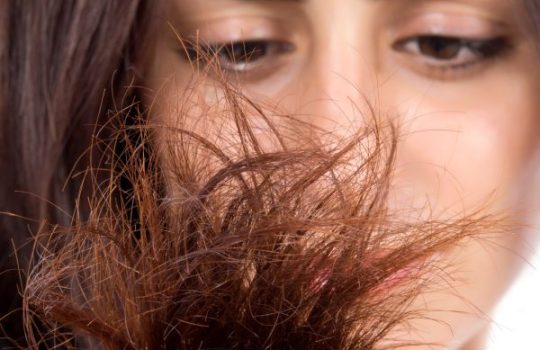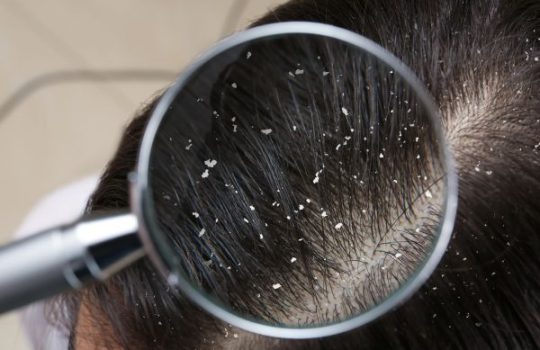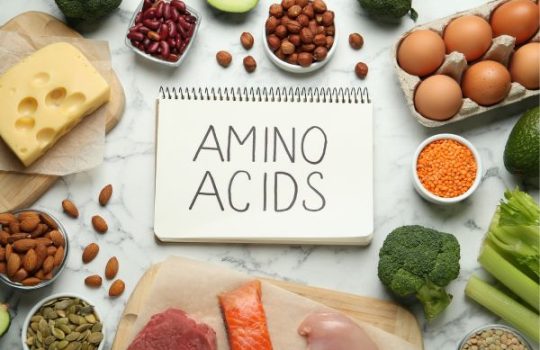Nutritional deficiencies associated with hair loss
Hair loss can be an alarming and disturbing symptom. In France, around 2 million women are affected by abnormal hair loss during their lifetime. It is not only an aesthetic problem, but one that can also have psychological impacts and affect self-confidence. It is important to understand the causes of hair loss, this helps identify possible underlying problems such as nutritional deficiencies.
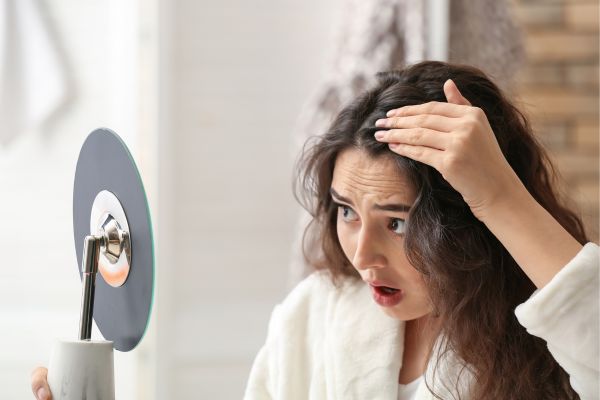
The different nutritional deficiencies that affect hair health
1) Iron deficiency
Iron is an unexpected ally for our hair! Essential for our body, it is at the heart of the production of hemoglobin, a protein responsible for transporting oxygen in our body. But did you know that this precious mineral also plays a determining role in the health of our hair? Indeed, iron actively participates in the growth and repair of cells, including those which stimulate the growth of hair fibers. So, when our body lacks iron, our hair can pay a high price, even falling out.
But how can our body find itself lacking iron? Several reasons can explain this. This may be due to diet, significant blood loss, pregnancy or difficulty in our body absorbing iron properly. Fortunately, nature offers us a wide range of foods rich in iron to help us meet these needs. We think in particular of red meat, fish, poultry, but also lentils, beans, spinach and cereals enriched with iron.
If you feel tired, pale, short of breath, have headaches, cold hands and feet, and notice more hair loss than usual, you may be suffering from a deficiency. hell. In this case, do not hesitate to consult a health professional, they will be able to advise you on the best ways to fill this deficiency, whether through diet or iron-rich supplements. Be careful though, excess iron can be harmful to your health, which is why it is important to get medical advice!
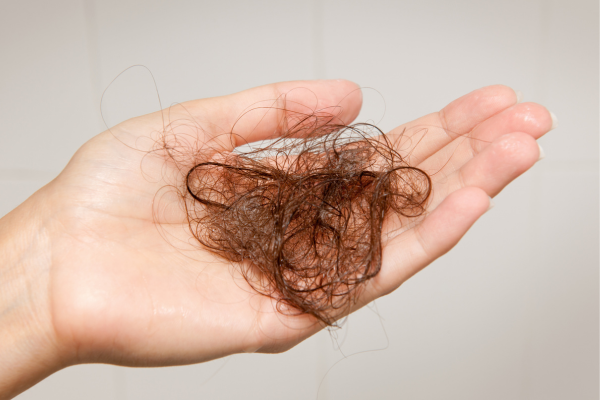
2) Vitamin D deficiency
Vitamin D, often called the “sunshine vitamin,” is a true blessing for hair. It plays a crucial role in the creation of new hair follicles, the small structures from which our hair grows. A nutritional deficiency in vitamin D can therefore lead to weight loss or even baldness in the most severe cases.
But how can we lack this sunshine vitamin? If we live in areas with little sunlight, especially in winter, or if we spend most of our time indoors, we may not get enough sunlight, which is our main source of vitamin D Additionally, some people may have difficulty converting sunlight into vitamin D because of their age, skin pigmentation, or certain medical conditions.
Fortunately, to compensate for these nutritional deficiencies, vitamin D can also be found in certain foods such as fatty fish (salmon, trout, tuna), beef liver, cheese, egg yolks and mushrooms. Supplements based on vitamin D can also be a solution, such as our anti-hair loss and growth supplement which contains both vitamin D, but also vitamin B, zinc or even keratin, it is the one of the most complete supplements on the market for taking care of hair, skin and nails!
If you experience constant fatigue, muscle pain, bone pain, depressed mood, or notice more hair loss than usual, you may have nutritional vitamin D deficiencies. Don't hesitate do not consult a health professional to find out more!
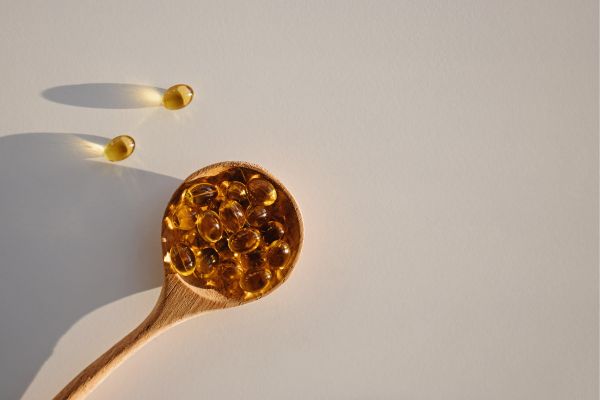
3) Vitamin B deficiency
Ah, B vitamins! These essential nutrients are a real cocktail of benefits for our body, and our hair is no exception. In particular, biotin (B7) and folate (B9). B vitamins contribute to the production of keratin, a key protein in the structure of our hair. Without sufficient intake, our hair can become fragile, dull and fall out more than usual.
But how could anyone lack these crucial vitamins? An unbalanced diet, certain intestinal diseases, pregnancy, alcoholism or prolonged use of certain medications can contribute to nutritional deficiencies in B vitamins. As varied as their benefits, food sources of B vitamins are numerous. You can find them in meat, eggs, dairy, legumes, nuts and seeds, and some fruits and vegetables. Cereals fortified with B vitamins are also a great option.
If you experience constant fatigue, mood disorders, skin or hair problems, or digestive problems, you may have nutritional deficiencies in B vitamins. Medical advice can help you confirm this deficiency and find a solution to fill it.

4) Protein deficiency
Proteins are essential macronutrients, they are not only essential for our muscles, but also for our hair. Our hair is actually made of keratin, a protein, which means that without sufficient protein intake, hair can become dry, brittle and lose density.
But how could we lack protein? A poor diet, certain medical conditions affecting nutrient absorption, or increased protein needs, such as during pregnancy or breastfeeding, can lead to nutritional protein deficiencies.
Protein sources are many and varied, meaning there are options for everyone, regardless of their dietary preferences or restrictions. Meats, poultry, fish and eggs are excellent sources of protein, as are dairy products. For those following a vegetarian or vegan diet, legumes, nuts, seeds and whole grains are also excellent sources of protein.
If you constantly feel tired, have trouble recovering from exercise, are losing weight unintentionally, have injuries that take time to heal, or notice your hair is getting thinner or fall, you may have a protein deficiency. Consult a healthcare professional who can assess your situation and advise you on the best way to fill this deficiency.
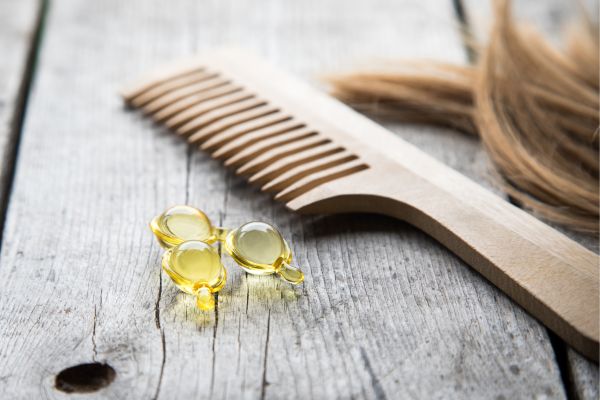
How to identify nutritional deficiencies?
Recognizing the signs of nutritional deficiencies can sometimes be difficult. Symptoms are often subtle and can manifest in different ways. For example, fatigue may be a sign of iron, B vitamins or protein deficiency. Muscle weakness could indicate a vitamin D deficiency. Dry skin could be a sign of vitamin A or B deficiency. And of course, hair loss could be caused by a deficiency of iron, vitamins D, B or proteins.
These symptoms may be accompanied by other less obvious signs, such as mood disorders, problems concentrating, decreased immunity, joint or muscle pain, sleep disturbances, changes in appetite or weight, and many others. All of these symptoms are your body's way of signaling that it's missing something important.
That's where blood tests come in. They can help confirm the diagnosis and identify exactly which nutritional deficiencies are causing it. A simple blood sample can provide a wealth of information about nutrient levels in the body. It is important to remember that if you have symptoms that could indicate nutritional deficiencies, you should consult a healthcare professional. Only he will be able to correctly interpret your symptoms and test results, and recommend the best solution.


